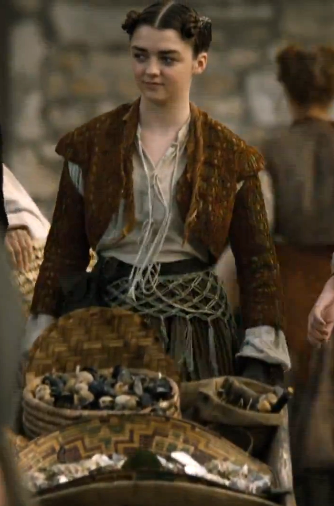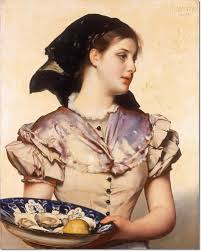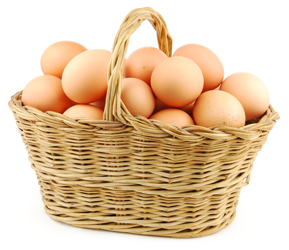♬Eggs in her basket
♬ Quare Bungle Rye (versione irlandese)
♬Oyster Girl
Come le donne nelle ballate tradizionali affrontano la questione del sesso e affrontano la maternità fuori dal matrimonio.

In un gruppo di ballate provenienti dalle isole britanniche, che si potrebbero classificare con il termine “a basket with surprise”, si narra in modo comico dell’ingegnosità delle ragazze madri del 700-800.
Molti erano gli stratagemmi per far pagare all’uomo un risarcimento in denaro dopo le “gioie” del sesso seguite da una gravidanza. Non necessariamente il malcapitato è il padre del bambino, ma viene preso a bersaglio semplicemente per la sua ingenuità!
In tutte questi testi si allude al cesto della fanciulla come a una gravidanza “a sorpresa” infatti dentro c’è un bambino che viene lasciato come “pacco” (cioè come fregatura) al malcapitato protagonista (che proprio estraneo alla faccenda non deve essere visto che in una delle tante versioni viene riconosciuto come padre del bambino).
La versione tradizionale popolare in Inghilterra, Scozia e Irlanda prende il titolo di “Oyster Girl” (The Basket of Oysters) di cui diverse copie ottocentesche possono essere rintracciati presso la Bodleian Library. In Mudcat sono riportate tutta una serie di ballate sempre nella collezione della Bodleian Library che partono dal 1700 e trattano lo stesso tema (vedi). Il tema si accomuna anche alla ballata inglese intitolata più variamente “The Basket of Eggs”, “Eggs in Her Basket” o “Eggs and bacon”.
EGGS IN HER BASKET
[ Roud 377 ; Master title: The Basket of Eggs ; G/D 2:307 ; Ballad Index VWL018 ; Bodleian Roud 377 ; Mudcat 17061 ; trad.]
Le uova sono il simbolo della fertilità e della vita quanto mai allusive di una gravidanza e per di più custodite in un paniere!
La versione The Basket of Eggs / Eggs in Her Basket / Eggs and Bacon è stata collezionata agli inizi del 900 da Ralph Vaughan Williams nel Norfolk, Suffolk e Sussex.
Così scrive Mike Yates (in “Good Hearted Fellows: Traditional Folk Songs, Music Hall Songs, and Tunes from Suffolk”):
Il folklorista inglese Roy Palmer ha fatto risalire questa canzone a The Man of War’s Garland, un libretto stampato nel 1796 (Bodleian Library, Harding Chapbooks, A15, n. 19). La canzone si intitolava Eggs and Bacon e racconta di due marinai che rubano il cesto di una donna, pensando che sia pieno di uova e che intendono far cuocere in una taverna. Quando viene scoperto un bambino nella cesta, offrono cinquecento sterline a qualsiasi donna che lo prenda in affidamento. Certo, il tutto è una messa in scena della madre che, riconosciuto uno dei marinai, il padre del bambino, prende i soldi prima di dichiarare di essere la madre! Gavin Greig, l’assiduo collezionista di canzoni scozzesi, ha trovato nove versioni, che ha intitolato The Foundling Baby, anche se i cantanti di tutta l’Inghilterra e della Scozia hanno preferito usare un altro titolo “The Basket of Eggs”. Alla fine degli anni ’50 Ken Stubbs raccolse una versione di uno zingaro chiamato Frank Smith e una registrazione della canzone, cantata dalla moglie di Frank, Minty Smith, può essere ascoltata nel CD My Father’s the King of the Gypsies.[1]
I
It’s of two young sailor lads out a-walking
With their pockets being both lined with gold
As they went a-walking and civilly talking
O some fair pretty damsel they do behold
II
O lady, lady can I carry your basket?
O there’s eggs in the basket oh do take care,
And if you should chance to outwalk me,
At the halfway house you’ll find me later there.
III
These two young men they start out walking
Until they come to the halfway house
O landlord, landlord have you any bacon?
For in my basket I’ve eggs to fry
IV
O that landlord went out to the basket
A-thinking he’d got eggs to fry
O say young man ain’t you mistaken
O for in this basket we’ve got a child.
V
Up steps this Nancy o dearest Nancy
That had taken to bed last Whitsuntide(1)
We got this young child since I came your fancy
So now gay fiddler you’ve got to pay(2).
VI
That child’s not ours, lovely Nancy
He’s no babe o’ mine nor no friends beside(3)
I will take it I’ll kindly treat it
If you will say all my money’s paid
VII
Oh that young man went up to the basket
He’s kicked it around and around the floor
“Oh since it is done I will surely pay it
But damn me if I do eat eggs anymore”
Traduzione italiana Cattia Salto
I
C’erano due giovani marinai che passeggiavano
con le tasche piene di soldi
andando in cerca di una civile conversazione
con delle graziose damigelle appena adocchiate
II
“O signorina, posso portarle il cestino”
“Ci sono delle uova nel cesto fate attenzione
e se volete portarlo per me
mi troverete più tardi all’ostello”
III
Questi due giovanotti ripresero a camminare
finchè arrivarono all’ostello
“O padrone avete della pancetta?
Che nel mio cesto ho delle uova da friggere”
IV
Il padrone uscì per il cesto
pensando di dover friggere delle uova
“Giovanotto vi siete sbagliato
perchè nel cesto avete un bambino!”
V
Giù venne Nancy la carissima Nancy
che lo aveva preso nel letto nelle scorse Pentecoste(1)
“Abbiamo avuto questo bambino dopo che sono stata al tuo piacere, così ora devi pagare il violinista (2)”
VI
“Quel bambino non è nostro, bella Nancy
non è un mio bambino né degli amici qui intorno”(3)
“lo terrò io e lo tratterò gentilmente
se pagherai tutti i soldi”
VII
Quel giovanotto si è avvicinato al cesto
e lo ha preso a calci per tutto il pavimento
“Poiché è stato fatto pagherò di certo,
ma che sia dannato se mangerò altre uova!”
NOTE
1) la pentecoste è una festività ebraica traslata nella tradizione cristiana per simboleggiare la discesa dello Spirito Santo e la nascita della Chiesa, detta anche festa dello Spirito Santo, la quale conclude (in entrambi le religioni) le feste del periodo pasquale. Ancora nel XIX secolo in Italia durante la messa di Pentecoste si facevano piovere dall’alto dei petali di rose rosse, per evocare la discesa dello Spirito Santo (la “Pasqua rosata” come viene chiamata ancora in alcune zone del centro e del sud dell’Italia)
2) una volta il violinista chiamato per suonare musica da ballo era pagato dalle coppie alla fine dell’esibizione. To pay the fiddle è un’espressione idiomatica per dire che si deve affrontare le conseguenze delle proprie azioni. E’ come dire in senso metaforico: paga dopo che hai “consumato”
3) qui manca la strofa in cui il ragazzo dice di voler pagare 50 ghinee a chi vorrà prendersi cura del bambino
Susan McKeown in Sweet Liberty 2004
OYSTER GIRL
[ Roud 875 ; Master title: The Oyster Girl ; Laws Q13 ; G/D 2:304 ; Henry H725 ; Ballad Index LQ13 ; Bodleian Roud 875 ; Wiltshire 424 ; trad.]

Anche qui abbiamo le allusioni sessuali riferite al cibo, ma è l’ostrica invece del cesto a sottintendere la vulva femminile, il cesto però è sempre presente, e viene lasciato dalla ragazza come “pacco” all’incauto protagonista dopo che lo ha derubato (ovvero si è presa quello che le spettava).
Qui non viene espressamente menzionato il bambino lasciato nel cesto, anche se la frase alla luce del tema più generale assume un più preciso significato! L’incontro descritto avviene tra un marinaio e una “giovane donnina” e la ballata si può classificare oltre che come comedy song sia come una drinking song che una sea song.
Una prima versione è comparsa in stampa nello “Stirling chapbook” di M Randall, c.1794-1812, con il titolo “The Eating of Oysters”.
Ewan McColl & Peggy Seegar la registrarono nell’album “Travellers’ Songs from England and Scotland”, 1977, e la ballata viene spesso suonata nelle Renaissance Fair come musica di epoca elisabettiana e “pirate stuff”, ma anche come melodia nelle ceilidh e barn dance (o le Morris dance) spesso classificata come “Cercle circassien”. E’ anche una scottish country dance.
Roy Palmer scrive nelle note di copertina dell’album Phil Tanner (2003): “La sola menzione delle ostriche – a lungo ritenute afrodisiache – sarebbe stata sufficiente per preparare l’ascoltatore a una sorta di intrigo amoroso. La prima apparizione della canzone in stampa sembra essere stata come The Eating of Oysters in un libretto con altri sette testi pubblicato da M. Randall di Stirling in Scozia, c.1794-1812, sotto il titolo generale di A New Patriotic Song. Con l’aiuto di ulteriori ristampe, The Oyster Girl si diffuse in Gran Bretagna, Irlanda e Stati Uniti, e rimase nella tradizione orale fino alla fine del ventesimo secolo.”
I
As I was a-walking down a London street
A pretty little oyster girl
I chanced for to meet
I lifted up her basket
and boldly I did seek
Just to see if she had any oysters
II
“Oysters, oh oysters, oysters, said she
These are the finest oysters ever you will see
I sell them three a penny
but I’d give them to you free
For I see you are a lover of oysters”
III
“Oh Landlord, I cried
Have you got a little room
that’s empty and nearby
Where me and my pretty
little oyster girl may lie
While we bargain for her basket of oysters?”
IV
We hadn’t been upstairs
for a quarter hour or more
When that pretty little oyster girl started for the door
She’d gone picked my pocket,
down the stairs she tore
But she left me with a basket of oysters
V
“Oh landlord, I cried
Did you see that little oyster girl drinking by my side?
She’s gone picked my pocket”
but the landlord just replied
“Son, you shouldn’t be so fond of your oysters”
Traduzione italiana Cattia Salto
I
Mentre camminavo per London street
una piccola e bella venditrice di ostriche
ho avuto la ventura d’incontrare,
ho alzato il suo cesto
e con audacia ho cercato di vedere
se c’era qualche ostrica.
II
“Ostriche, o ostriche -diceva –
ci sono le ostriche più belle mai viste;
le vendo a tre penny
ma te le darò gratis,
perchè vedo che sei un intenditore di ostriche”
III
“O padrone di casa – gridai –
hai una stanzina
che sia vuota e vicina,
dove io e la mia piccola
venditrice di ostriche possiamo stare
mentre negoziamo per il suo cesto di ostriche?”
IV
Eravamo di sopra
da nemmeno un un quarto d’ora o più
quando la bella ragazzina delle ostriche uscì dalla porta,
si prese la mia sacca
e giù dalle scale si precipitò
e mi lasciò con il cesto di ostriche.
V
“O padrone di casa -gridai -hai visto
la ragazzina delle ostriche che beveva al mio fianco?
Si è presa la mia sacca”
ma il padrone di casa rispose
“Figliolo non dovresti essere così amante delle ostriche!”
[1] “English folklorist Roy Palmer has traced this song to The Man of War’s Garland, a chapbook that was printed in 1796 (Bodleian Library, Harding Chapbooks, A15, no. 19). The song was titled Eggs and Bacon and tells of two sailors who steal a woman’s basket, thinking it to be full of eggs which they plan to have cooked in an alehouse. When a child is discovered in the basket they offer five hundred pounds to any woman who will foster the child. Of course, the whole thing is a set-up by the mother who, having recognised one of the sailors—the father of the child, takes the money before declaring who she is! Gavin Greig, the assiduous Scottish song collector found nine versions, which he titled The Foundling Baby, though singers throughout England and Scotland have preferred to use another broadside title The Basket of Eggs. In the late 1950s Ken Stubbs collected a version from a Gypsy called Frank Smith and a recording of the song, sung by Frank’s wife Minty Smith, can be heard on the CD My Father’s the King of the Gypsies.” [Mike Yates ]
(tratto da http://mainlynorfolk.info/tony.rose/songs/basketofeggs.html)
[2] “The very mention of oysters—long reputed to be an aphrodisiac—would have been enough to prepare the listener for some kind of amorous intrigue. The song’s earliest appearance in print seems to have been as The Eating of Oysters in a garland (booklet) with seven other texts issued by M. Randall of Stirling in Scotland, c.1794-1812, under the overall title of A New Patriotic Song. With the help of further broadside printings, The Oyster Girl spread through Britain, Ireland and the USA, and remained in oral tradition until late in the twentieth century.”[Roy Palmer]
FONTI
https://my.strathspey.org/dd/dance/5143/
https://thesession.org/tunes/3319
http://mysongbook.de/msb/songs/o/oystergi.html
https://mainlynorfolk.info/peter.bellamy/songs/theoystergirl.html
http://www.mudcat.org/thread.cfm?ThreadID=17061

